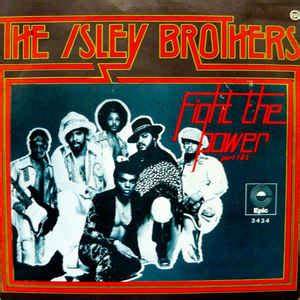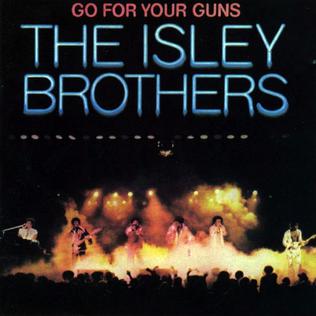
The Isley Brothers are an American musical group originally from Cincinnati, Ohio, that started as a vocal trio consisting of brothers O'Kelly Isley Jr., Rudolph Isley and Ronald Isley in the 1950s. With a career spanning over seven decades, the group has enjoyed one of the "longest, most influential, and most diverse careers in the pantheon of popular music".

"It's Your Thing" is a funk single by The Isley Brothers. Released in 1969, the anthem was an artistic response to Motown chief Berry Gordy's demanding hold on his artists after the Isleys left the label in late 1968.

"Fight the Power" is a song recorded by the Isley Brothers, who released the song as the first single off their landmark album, The Heat Is On. The song is notable for the usage of the word bullshit, which was censored during radio airplay.

3 + 3 is the eleventh album released by the Isley Brothers for the Epic label under their T-Neck imprint on August 7, 1973. In 2020, the album was ranked at 464 on Rolling Stone's 500 Greatest Albums of All Time list.

Winner Takes All is the seventeenth studio album by The Isley Brothers and released on T-Neck Records and their seventh record to be distributed by Epic Records on August 21, 1979. The album included the number-one R&B hit, "I Wanna Be With You" and the top 20 UK disco hit, "It's a Disco Night ".

Live It Up is the twelfth album by the Isley Brothers, released on September 7, 1974. It was their second major-distributed album with Epic Records under their T-Neck subsidiary.

The Heat Is On is the thirteenth studio album by American soul and funk group The Isley Brothers, released June 7, 1975 on T-Neck Records and Epic Records. Written and produced entirely by the group, the album was recorded in 1975 at Kendum Recorders in Burbank, California. The group implemented many acoustic and electric instruments during its recording, including guitar, piano, and synthesizer. Primarily a funk and soul outing, The Heat Is On features musical elements of rock music, and it is divided between uptempo funk songs and subdued smooth soul-ballads.

Harvest for the World is the fourteenth album released by The Isley Brothers on their T-Neck imprint in May 1976.

Go for Your Guns is the fifteenth album by the Isley Brothers. Released on April 16, 1977, on their T-Neck label, it was also the band's fifth album to be distributed by their deal with Epic. Released in mid-April 1977, the album peaked a month later at No. 1 on Billboard's Top Soul chart, and at No. 6 on the Billboard 200.

Showdown is an April 1978 album by the Isley Brothers. It was released on their T-Neck Records label. Singles released from the album include the #1 funk/disco hit, "Take Me to the Next Phase" and the top 20 R&B slower, "Groove With You". The album became another platinum album for the Isleys. It was remastered and expanded for inclusion in the 2015 released CD box set The RCA Victor & T-Neck Album Masters, 1959-1983.

Between the Sheets is the 22nd album released by The Isley Brothers on their T-Neck imprint on April 24, 1983. The album is notable for the title track, the follow-up hit "Choosey Lover", and the ballad "Touch Me". The song also appeared in the 2007 comedy film, Norbit.
"Harvest for the World" is a 1976 single released by American musical group The Isley Brothers on their T-Neck imprint. It was the title track from their 1976 album Harvest for the World.
"Pop That Thang" is a 1972 funk song released by The Isley Brothers on their T-Neck imprint. Co-written by the three Isley brothers: O'Kelly, Rudolph and Ronald, Howard Kelly and Clive Otis, the song is an uptempo dance number that was featured on the group's 1972 album, Brother, Brother, Brother. A successful record, it reached #3 on the national R&B charts and #24 on the pop singles chart. Billboard ranked it as the No. 100 song for 1972.
"Keep On Doin'" is a song recorded by The Isley Brothers, who released the song from their 1970 album, Get into Something. Though the track's chart performance was modest at best, it would later inspire the funk instrumental, "The Grunt", recorded by James Brown's backing band at the time, The J.B.'s.
"Don't Say Goodnight " is a 1980 soul and quiet storm record by the Isley Brothers, released on their T-Neck imprint. The track was released as the first single from their 1980 platinum album, Go All the Way.
"Choosey Lover" is a 1983 soul song by The Isley Brothers. Released on their T-Neck imprint, the song was their second consecutive top ten R&B hit after their seminal "Between the Sheets" hit No. 3 on that chart. It was the second of two chart-topping singles the Isleys released off their aptly titled Between the Sheets album. "Choosey Lover" was also the last charting single to feature the 3 + 3 lineup of the band. A year later, younger brothers Ernie Isley, Marvin Isley and their brother-in-law Chris Jasper left to form Isley-Jasper-Isley while older brothers Ronald Isley, Rudolph Isley and O'Kelly Isley continued on under the "Isley Brothers" name.
"The Pride" is a 1977 funk song by The Isley Brothers, released on their T-Neck imprint. The song, which was the first single released from their album, Go For Your Guns, was written as a warning to politicians to be the leader that the people need and to others who want change reminding them that "the pride makes (them) feel that (they) belong". The song was one of several socially conscious political songs the Isleys recorded throughout the 1970s including "Fight the Power Pts. 1 & 2" and "Harvest for the World". While the song peaked at sixty-three on the pop charts, it reached number-one on the R&B singles chart becoming the group's third number one on the chart.
"Footsteps in the Dark" is a 1977 slow jam recorded by The Isley Brothers as an album track featured on the group's double-platinum album Go For Your Guns. It was the B-side to "Groove with You", which reached #16 on the R&B singles chart. The track also marked Ron Isley's growing transition into singing more ballads, compared to the band's earlier funk approach. The song is featured in the 2008 video game Grand Theft Auto IV on the fictional R&B radio station The Vibe 98.8.
"What It Comes Down To" is a song by The Isley Brothers, who released it in late 1973 as a follow-up to the group's crossover pop hit, "That Lady, Pt. 1 & 2".

"It's a Disco Night " is a 1979 club hit for The Isley Brothers, released on their T-Neck label as the second single from their gold-certified album, Winner Takes All. The song is notable for being one of the few disco-based songs the Isley Brothers released. Beforehand, the group were known for their mixture of funk, rhythm and blues and rock. The song was led by brother Ronald Isley while his brothers Kelly and Rudolph Isley chanted "rock don't stop" in the background. The song briefly charted on the Billboard Hot 100 peaking at number 90, hitting number 27 on the R&B chart. Outside the US, "It's a Disco Night" reached number 14 on the UK Singles chart.










